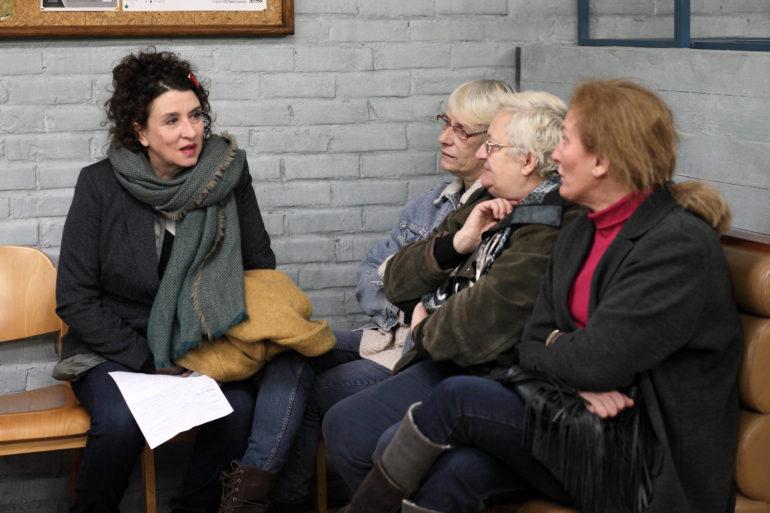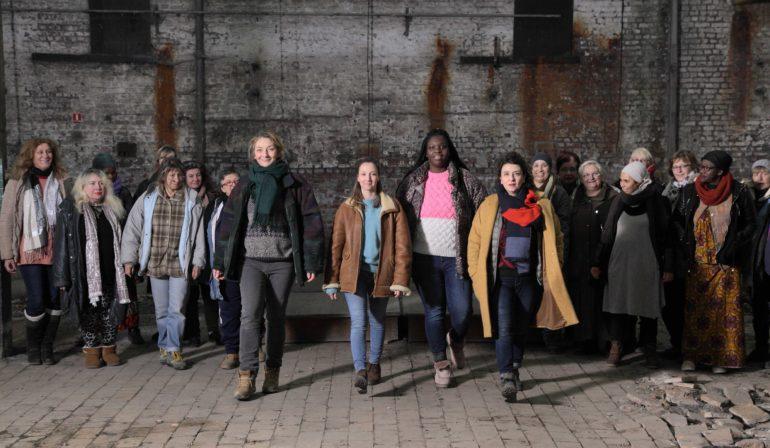‘Invisibles’ Director Louis-Julien Petit on His Socially Minded Smash
By Ben Croll
LOS ANGELES (Variety.com) – PARIS — Far from a dumping ground, the months of January and February have become synonymous in France with the kinds of highly polished crowd-pleasing comedies that dominate the annual box-office.
This year is no exception, only nestled among the likely blockbusters “Serial Bad Weddings 2” and “City Hunter” is Louis-Julien Petit’s socially minded dramedy “Invisibles.” The story of a group of social workers fighting to keep a woman’s homeless shelter from closing, the film has opened to significant box-office numbers in these early weeks of year, and that’s no accident of timing.
Petit took inspiration from author-filmmaker Claire Lajeunie’s documentary and book about France’s invisible women and built a crowd-pleasing comedy around the subject. Produced by French shingle Elemiah and being sold by Charades, the film mixes well-known comedic stars like Audrey Lamy and Noémie Lvovsky with several non-professional actresses, a number of whom also appeared in the original doc.
Appearing under pseudonyms like Lady Di, Brigitte Macron and Chantal Goya, these non-professional actresses lend the project an air of authenticity, and the boisterous performs aren’t afraid to share their stories. “These women are combatants,” says Petit. “They have seen great precariousness in their lives – many of them have lived on the streets or in the margins – and because we shot in sequence, the film is a narrative of them pushing through.”
Was it a challenge to strike that balance between social realism and crowd-pleasing comedy?
I wanted to make it a comedy in order to create a link, a bond, between the viewer and the subject. It was important to find light and positivity in this material, and I must admit that took some time. The script went through several versions and most of them ended up in the garbage because they were too anchored to the original documentary. After I saw that film I spent a year doing my own research, going to shelters and seeing for myself, and so I wanted to write a film that could help, that could be of assistance to the people who volunteer there.
The humor, the characters and the décor all came directly from the book and doc. My job was to work them into a larger story. The work required a meticulous and benevolent touch at every step of the process. It took me three tries to get the screenplay right, and I had to be very precise with the editing and the music. The film needed to laugh with these characters, but never at them. Nor could the film could go too far to other side of the spectrum; it needed to stay at a human scale and not dip towards miserablism.
Which is interesting, because the current festival marketplace incentivizes a more somber treatment of such subjects, a path you wanted to forgo.
As both a filmgoer and citizen, I need to laugh. I worked with Isabelle Adjani on my previous film [“Carole Matthieu”], and she said that the movies should either entertain or reflect hard truths, and I wanted this film to do both. I wanted audiences to have good time while still recognizing the real world.
I was inspired by a lot British comedies made in Thatcher and post-Thatcher eras. Films from directors like Ken Loach and Stephen Frears that examined a highly pressurized society and were still able to laugh at it. You could say that we’re in a similar situation today. Things are tense in France these days. People either feel left behind or feel like they’ve got a hand around their throat. Today, those people demand to be seen and heard, and I think it’s entirely possible to do so with warmth. I say that as a filmmaker. I think we can tell those stories in a positive light, to tell them in order to fight for what’s right.
There’s a big debate in the film world right now about the politics of representation – you know, who has the right to play certain character from certain backgrounds. You sidestepped some of those questions by casting many non-professional actresses who had lived some of the experiences depicted in the film.
I didn’t really ask those questions on a larger scale. Still, there are two characters in the film that I directly transposed from the original documentary, and there was never a possibility that those two women wouldn’t play themselves. Nobody else could bring their truths. The film needed to be true, it needed to have complexity and diversity, and that came with the cast. The cast is also multi-generational and multi-ethnic, because that reflects our own world. That is French society today.
As a filmmaker, you’re always looking to stay credible. I wanted to stay true. I had written the roles and created the characters, but I hoped they would impart their own realities, that they would bring their own responses and emotions to the film, which I think they did really well. Audrey Lamy, Corinne Masiero and the other professional actors said that the non-professionals pushed them to be better, to be more natural.
“Invisibles” is not a huge production. It only opened on 311 screens across France, and still managed to sell nearly 300K tickets within its first week of release. Did you anticipate such a response?
You can never know that kind of thing. We had good responses at festivals and won some audience prizes, but we weren’t expecting anything upon release. As always, you’re scared and nervous waiting for the numbers on the first day. We had a strong first weekend, and the film received the highest audience satisfaction score since 2011. The film got an average of 9.7/10, which is incredibly rare. The highest scoring film last year was “Capernaum,” which was9.6/10. So I’m excited to screen the film abroad, to see how international audiences respond. And we’re going to slowly start down that path. I hope to take Lady Di, Chantal, Beyoncé on the road. I want them to represent the film.
So you will take them along?
If we’re invited, we’re coming! Chantal and Lady Di have never taken a plane before, and they told that they want to change that as soon as possible. [Laughs] I heard from Lady Di, today. She was out buying groceries and plenty of people stopped her, asking her about the film. I’m happy for them, because this experience has been so positive. [And it’s been positive on a larger scale as well]. Anne Hidalgo, the Mayor of Paris, saw the film at festival in August and then went on to open a shelter in Paris. Since December 13t, 45 women have been given a secure place to live in Paris’ City Hall. Hidalgo told me that she saw the movie and wanted to act, and she did. I hope she opens even more going forward.
You could say the film was a success before it ever opened.
The fact that we must open more and more shelters is obviously not great. Though I’m pleased that civic institutions are reactive to the issues that the film tries to bring to light, because we’re at a critical point.


